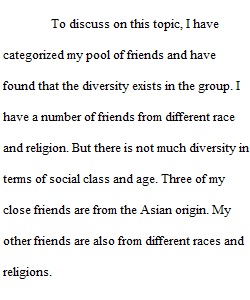


Q Module 5 In the classical, Greek period, friendship consisted of close bonds between men of essentially the same race and social standing. It was unheard of for men and women to enjoy friendships or for a master and slave to interact socially. This changed a bit in Roman times, and today, many of us enjoy a lot more diversity in our friendships. Still, as Vernon shares, similar to the politics of friendship in Ancient Greece, we mirror a bit of that homogeneity in our friendships today: “We see as much to this day, inasmuch as friendships across social classes and ethnic divides are relatively rare” (p. 171). Before completing this activity, please be sure that you have read: Friendship Values and Cross-Category Friendships: Understanding Adult Friendship Patterns Across Gender, Sexual Orientation and Race [PDF, File Size 217 KB]. In at least 250 words total, please answer each of the following, drawing upon your reading materials and your personal insight: • To what extent do your friendships represent a range of diversity, in terms of class, race, religion, and ethnicity? • How have you personally been challenged to draw from a diverse pool of individuals in your experience of “close” friendships? What are some of the barriers, if any?
View Related Questions